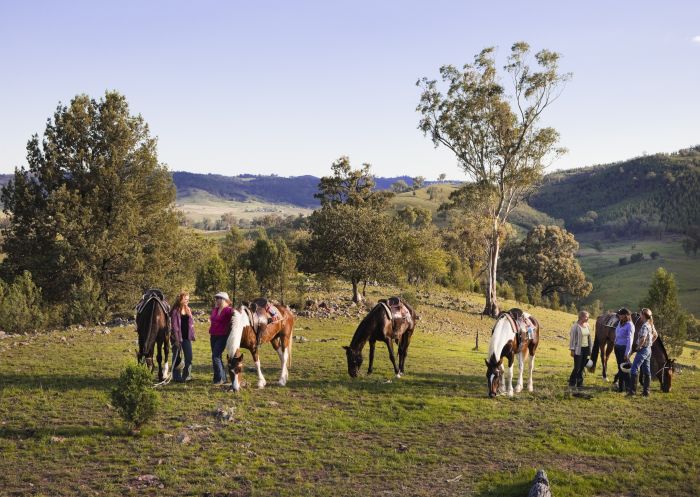

Bingara
Lake Copeton, Copeton



The New England region of NSW is known as ‘gemstone country’. And Bingara deserves its place here, thanks to a rich and fascinating gold- and diamond-rush history. Set on the banks of the Gwydir River, Bingara is also a mecca for outdoor enthusiasts, providing plenty of opportunities for avid anglers as well as hikers, bikers and water enthusiasts.
Diamonds, sapphires, tourmalines and gold… the bounty found in the creeks and rivers of this New England region once put Bingara on the world stage. Fossickers descended to seek their fortunes in the 1850s, when gold was first discovered; diamonds came later in the 1880s, and at this time, Bingara was Australia’s largest diamond producer. Small wonder this pocket of NSW is known as ‘gemstone country’.
Take a deep dive into this history at the Three Creeks Tourist Gold Mine, where you can browse displays of the riches found in this area (everything is for sale), and then try your hand at panning for garnets and quartz crystals. Anything you find, you keep. Can’t get enough? More heritage awaits at the Gem and Mineral Museum, part of the Bingara Historical Museum Complex.
Bingara is one of the stops on the Fossickers Way touring route, which also takes in Barraba, Inverell, Tamworth and Armidale, among other New England towns. Along sun-dappled roads there are plenty of places to pause and fossick for gold, gem and crystals. Pick up a fossicking map from the Bingara Visitor Information Centre.

Trail riding, Wade Horses Bingara
Restored to its former glory, the Art Deco Roxy Theatre & Greek Museum is a wonderful place to catch a show. The establishment also houses a small museum, telling the story of Greek immigration, as well as a cafe. Another of the town’s grande dame’s is the 1879 Imperial Hotel, serving cafe-style meals and pub fare from breakfast through dinner – there’s also on-site accommodation, should you wish to linger.
Northwest of Bingara is the Myall Creek Massacre Memorial, which was established as a tribute to the group of 28 unarmed Aboriginal people killed by a gang of stockmen in 1838. Dotting the walk are various historical stones and etchings by Aboriginal artist Colin Isaac telling the story of the massacre. This heritage-listed memorial is one of Australia’s most important reconciliation sites. A service is held here every June long weekend.

Myall Creek Massacre Memorial Walk, Myall Creek - Credit: Gwydir Shire Council Bingara/Tourist Officer Jen Mead
Keen angler? You’ve come to the right place. The Gwydir and Horton rivers are some of the best inland freshwater fishing spots in Australia. There are boat ramps in the Copeton Waters State Park, where you can cast a line for Murray cod and golden perch. This is a popular place for boating, water skiing and bushwalking. You’ll also find plenty of great places to picnic.
If you like life in a slower lane, you can experience the meandering Gwydir River by hiring a canoe from Wade Horses Bingara. Keep an eye out for wildlife, including platypuses.
More water awaits at Copeton Dam, just a short drive east of Bingara. This is another popular fishing spot, and offers plenty of opportunities for swimming, water skiing, kayaking and more – there are also great trails to hike around the shore.

Lake Copeton, Copeton
Bingara is just over a 6.5-hour drive from Sydney, 5.5 hours from Brisbane and 1.5 hours from Glen Innes. The nearest airport is Moree, where you can hire a car for the 70-minute drive. You’ll find many places to stay, from hotels and country cottages to holiday parks, riverside camping and cabins.
Stay connected to Visit NSW for all the latest news, stories, upcoming events and travel inspiration.
All the insider news, tips and inspiration you need to plan your next trip, delivered straight to your inbox.
Sign UpVisitNSW.com is the official tourism site for Destination NSW.
© Copyright 2025 Destination NSW. All rights reserved